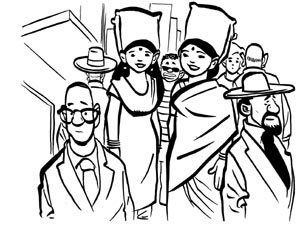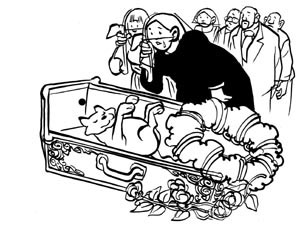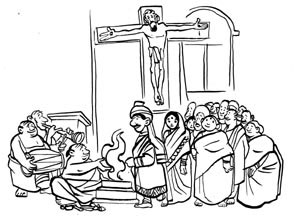Arts
Traveller's Tales

On the trail of bumbling and stumbling wanderers.
|
It is said the human race does not like to step out of its comfort zone. That’s probably what created the concept of home. Yet crowded railway platforms, airports and bus stations, swarm with humanity, bulging backpacks, oversized suitcases and worn out sneakers squeaking travel tales. Is it wanderlust, bravado, or just enquiring minds that want to know what lies beyond that which does not meet the eye?
There are those who love visiting new places, others search for a better life in the land of their dreams. While many find what they seek, others learn that the path to globetrotting may be strewn with more than stardust. Some of our Indian and non-Indian wanderers who stumbled and bumbled their way through pastures unknown, shared their sometimes humorous, sometimes poignant memories from their sojourns. Subra Viswanathan is the quintessential Tamil Brahmin boy who grew up in India, graduated from a prestigious engineering college and came to the United States in 1987, as part of a herd of young IT professionals. “We were bound by a common goal – make a lot of money and then make it back! I spent the first few days trying to figure out whether the shower curtain stayed inside or outside the tub and proudly did the usual desi things. I have pictures of myself posing next to every landmark in USA.” He also recalls a friend who confused Heren with Hers and Damen with Men and went into the wrong restroom at the Schipol Airport. “And this was before gangsta, at least Damen now could be da men,” says Viswanathan . Viswanathan recalls his American manager asking him if he went to work on an elephant, in India. “I told her my grand dad used to, but now we had a car.” Until he got married, Viswanathan couldn’t tell the difference between lettuce and cabbage, would always buy 110/220V equipment even though the chance of it ever making it to India was remote.
“I also didn’t know steak was pronounced ‘stake’ not ‘steek,’ and meatless did not include being ‘fishless’ and ‘chicken less,’ and that Waffle House was America. Really interesting when one is trying to be cool.” Viswanathan says one “not so cool” incident occurred when a colleague’s cat died and she went into mourning and cried a lot. “A fellow FOB (fresh off the boat) guy from our group, judging by her reaction, thought her Dad died and sent her condolences… Talk about embarrassment.” Viswanathan and his colleagues would try to befriend every Indian they encountered. “You know, big wide grin, me Bombay et tu? etc, till you learn to spot the ‘How the hell did you get here? look…'” Of course in later years, we did try desperately to be American, till our kids were born! Then we spent most of our time trying desperately to be more Indian than Gandhi.” For someone who was used to takingwhatever was dished out, it took Viswanathan time to appreciate that his boss actually considered him an equal and that he could be rewarded for having the courage to speak his mind. Viswanathan says living here has changed his perspective on life. It has given him the financial freedom to pursue his interests, his children opportunities he could not have dreamt for them in India, and even redefined religion for him. “Back home I would have been caught up in rituals. Some of which I didn’t believe in even then. Today I can have the freedom to look at the meaning behind each ritual and practice only what I believe in.” He says he has discovered that people do not come to America and become Americanized. He left his native land because he already believed in the American value system: freedom, being responsible for your own destiny, making independent choices. “This country clears your mind, because it teaches you to think for yourself.’
Jagdish Sheth, maverick marketing guru and author, had wanderlust in his blood from birth. As a toddler, he was displaced along with his family from Burma, lived in various cities in India before coming to America in the early 1960s. He recalls arriving in New York and looking at the humungous Sunday paper and protesting to the newsagent, “I want only one copy.” Told that it was only one copy, he preserved it for weeks trying to figure out its salvage value, because in India one traded old clothes and big bundles of newspapers for steel utensils. He once tried to haggle down the price of a shirt at a department store, warning the sales clerk, “My friend is waiting outside. I have only $3, take it or leave it!” Sheth recalls how he was on his own when it came to trying to figure out the American way of life at the University of Pittsburgh. At a Thanksgiving dinner by a kindly host family, he was gently prodded to eat the stuffing inside the turkey when he mentioned he was vegetarian. Sheth was a financially strapped student when he married his wife Madhu. “I still remember the day she landed in December. There was a 9-inch snowfall in Pittsburgh. We were doing nothing but running around and chasing each other in the snow. Having lived in Kutch and Madras, she could not believe what she saw.” His brother sent out printed wedding invitations with the auspicious swastika symbol. “We had no idea it was a symbol of the Nazis and we sent the invitation out to all my professors.” Every one chipped in to help the poor student marry and he was given access to the famous Hines Chapel for the wedding. But there was a hitch. “In Hines Chapel the key problem was how to set up the holy fire for the wedding ceremony. They said no holy fire permitted, there is no sprinkler system there. We compromised. We went around the Chapel grill instead! It was a landmark wedding!” Kishore Ramchandran, a computer science professor, came as a post graduate student to Wisconsin, with visions of hot babes and fast cars, thanks to James Hadley Chase novels and the sparse Hollywood movies playing in Indian theatres in the 1970s that riveted him back home. He discovered instead that cows were the flavor of his mid western town.
Ramchandran says it took time for him to adjust to the comraderie between professors and students. He recalls an orientation session for teaching assistants by a professor who was being aided by a little guy in shorts handing out papers. “We were pretty much ignoring him, thinking he was her son, when she pointed to him and said, ‘Let me introduce Professor Charlie Fisher to you,’ and our jaws dropped. We are not used to such familiarity back home.” Ramchandran also had to acclimatize himself to American English terminology. He was once waiting for a senior professor who was meeting with a teaching assistant. “When he came out, I asked him. ‘Is Angie free?’ The assistant lowered his voice and said, ‘She is not free, but she is relatively inexpensive.'” Ramchandran discovered that his lungi was a source of great curiosity. “Once I had my American friends sneak in on me to see if I was in a compromising situation only to find me fast asleep in a lungi. The Americans were curious as anything, ‘Hey man what are you doing sleeping in a skirt?'” Ramchandran admits that before he came to this country, he had a poor impression of people in academe. “In India my perception was that anyone who came to academia did so because he could not find a better job. Coming here and seeing the amazing work professors do made me change my mind and settle on teaching as a profession. The awards have been immense.” Ramchandran feels that this country has taught his children to be more open minded, more aware and free to question anything and as a result he has had to change his notions on parenting. Even though India is changing and becoming an economic power house in its own right, Ramchandran still feels his children have opportunities here they would not have in India. “The people who come here are top tier and so their kids too are academically gifted and top of their class. Their level of confidence is high and they can reinvent themselves as often as they want. My nephew was a nationally ranked tennis player in India, but had to opt for academics, because in India the concept of what is valuable is different. Here anyone can give anything a shot and if needs be, start all over again, without missing a step.” While Chhibber had been to neighboring Afghanistan, as the wife of a military attache, Narula had not done even that, so an international trip was quite an event for both of them.
What enamored them most here was the freedom of doing as they pleased. They did crazy things like putting henna in their hair, and for want of authentic shower caps, wrapping grocery bags around their heads and merrily going for a walk in their new heady contraptions. “Do you think people will mind?” asked Chhibber of Narula. “Who knows we are the wives of generals?” retorted the latter. To while the hours in between the application and the shampooing of henna, they proceeded to shop for a watch at an Iranian store. After they had been haggling in typical Indian style over the price for more than a few very long minutes, the Iranian guy turned and muttered to his wife in Persian, “These women are Indian and just like us they will haggle and argue and not buy a darned thing” Chhibber, whose stint in Afghanistan had honed her fluency in Persian, retorted in equally fluent Persian,”If you give us this $40 dollar watch for $13, which is really the right price, we will buy it.” The two then proceeded to take the ferry ride to the Statue of Liberty, but having paid the princely sum of 25 cents for the ride, the frugal women decided to stretch the quarter and would at the end of each trip follow the herd to leave the boat, but right at the exit, would stealthily turn around and mingle with the incoming crowd. They beamed with pride at their innovative skills for riding the crest seven times in a row and the quarter was a quarter well spent. Umesh Rathie, an engineer from India, came to the United States over two decades ago as a consultant. “All of us came here because we could not find the opportunities, and projects intellectually challenging enough in India,” Rathie recalls. “The rising tides raise every boat, and we too rose to the top quickly. Indian technocrats were greatly in demand in the 1980s and 90s and it was exciting times for us professionally and financially.” Rathie soon realized, however, that intellectual skills don’t automatically equip you to understand the ways of the American world! On his first day at work, Rathie meticulously arranged his table, got the stationary, the pencil, the pen, and then went to the secretary and asked, “I don’t have any rubber. Where can I get a rubber?” The secretary looked aghast: “You need a rubber?… in office, during office hours?” He responded, “Well obviously, I need to use it during office hours sometimes.” The secretary looked at him sternly, “Let me tell you something and don’t you forget it, never ask a lady for a rubber and in future buy your own.” “I discovered later, what we..er.. call rubber in India is called eraser here!” Rathie also recalls another hilarious incident when he accompanied his Gujarati manager in South Carolina to McDonald’s. His colleague asked a waitress in his heavy Gujrati-Indian accent, “I want large fries and a large Coke” Because of his accent, the coke sounded like something that rhymes with sock . The woman eyeballed him for one long, piercing moment and said with a straight face, “Man I don’t know about you, but aah am lookin for one ma self.”
Rathie and his colleagues also discovered the joys of driving a car on the highway and parking in the multi deck parking garages. In Detroit some of his friends from Tata-Unisys, came to work on a project and parked their car on the third floor. When they left after work, instead of putting the gear in reverse they pushed the accelerator and sailed forth. The headlines in the next day’s newspapers heralded the arrival of the “Flying Tatas.” If Indians have experienced culture shock in America, surely it is even more dramatic for their American counterparts seeking the Indian experience. What is their perception of this exotic land stereotypically associated with snake charmers, yoga, mysticism, and of course Hare Krishna? Angelo Stagnaro, an Italian American, grew up in ethnically diverse Greenwich Village in New York, and has travelled to more than 50 countries, but India stood in a class all by itself. “You can read up on India as much as you want, but nothing quite prepares you for the actual experience of being there.” Stagnaro first went to India in 1989 and knew the moment he landed at Delhi airport in 1989 that he was going to return, in spite of a sweltering summer. “I thought they were joking when they said it was 55 degree Celsius outside. I didn’t know thermometers could actually read the temperatures that high without exploding. I said that is impossible, my tea isn’t served at 55 degree Celsius!” Stagnaro says he felt an instant and close connection with India. How close a connection was never more evident than when Angelo stood in line on a train station in Bombay to buy a ticket. He felt a nudge. “One has to come to accept this in a country as populated as is India,” says Stagnaro . “I let it go the first time without even bothering to turn around. The second jostling threw me to the floor. I’m a patient person, but being thrown to the floor in a Bombay train station was too much for me.” He swirled around to confront the head of what he calls the largest cow in all of creation. “All I could hear in my head was the voice of my 6th grade teacher, Ms. Tienda, repeating to me, ‘The Hindus consider the cow to be sacred.’ And all I could think of was, ‘Oh, my God! They’re going to kill me! I’ve just touched a cow!'” One of Stagnaro’s friend, who accompanied him on this trip, wanted the complete Indian experience and decided to enrich it with a lungi. “It wasn’t at all that he was interested in a parody, but he was so entranced by Indian culture and was earning a PhD in Religious Studies that he went all out. Yes… that’s right… he bought a lungi.” Stagnaro says his friend was very white, tall, hairy, gangly and uncoordinated. “The lungi simply made him look like an idiot. I don’t know why it looks good on Indian men. My friend looked and walked like an exceedingly tall, lame ostrich with his legs hopelessly entangled in brightly colored cloth. Indians, men and women had difficulty looking into his face during a conversation with him. I tried to avoid standing next to him for fear that by proximity I would be accused of sharing his faux pas.” But the most amusing sight was of his friend leaping for Indian buses that flatly hrefused to stop. Lungis, says Stagnaro, are not for the intractably shy and innocent-of-heart when it comes to walking, but running in them requires a bravery and an emotional fortitude that very few Europeans can summon at will. “Call upon us to stand up for the downtrodden, to give generously to the poor, to fight a war where the rights of others need to be protected… all of this is child’s play. But, lest the causal Indian has a mean streak in him, ask not to have us run in a crowded street while wearing a lungi.” Despite these fun misadventures, India has given Stagnaro some if his most precious memories, “India means a country of amazing contrasts, between immense beauty and dirt, immense wealth and poverty, and yet you could not find a greater example of humanism anywhere as you would in India.” That is the same allure for Jim Maran, who has globe trotted for 30 years representing Motorola. “Custom clearance was a nightmare. If they took your computer you would never see it again, international phone calls cost a bundle, and yet it’s the ability of the Indian people to rise to any occasion and excel that is fascinating. You see 5-ton trucks carrying 20 tons of weight creaking at the edges being driven at night without headlights, and you are thinking boy this country is badly in need of infrastructure. Just then you are blown away by the outstanding achievements in certain segments of technology and business unparalleled anywhere in the world.” Christopher Meehan, a graduate student at New York’s Columbia University, says Nothing prepares you for either the humidity or the poverty. It is a country of such contradictions.” He was ecstatic when he reached Benaras. “There was so much free music there – the music festivals showcased the talents of the leading artists. Of course knowing Hindi really helped.” Meehan’s Hindi teacher had given him the name Kailash, when he was learning Hindi at the University of Wisconsin, to get into the skin of things. The teacher continued to call him Kailash while they were in India in his class room on Asi Ghat. The people in that neighborhood picked up on it. He continued to introduce myself as Christopher, but gradually became Kailash and really identified with the name. “Several years after returning home, if I heard someone call the name Kailash I would instinctually turn my head in response.” A Punjabi family he has befriended has rechristened him Satyananda. Meehan who went back to India recently says “Having been given these names, in a way, has contributed to broadening my sense of identity and has helped maintain a special connection with the experiences I had when living in India.” If Meehan feels embraced by India, famed American flautist Steve Gorn went through his version of the Quit India movement in 1995 after his passport was stolen on a train from Bodhgaya to Calcutta. Gorn went to the police station to report the loss. He was greeted joyously by a policeman with a calm yogic disposition who told him to relax and offered him an orange and then started taking down the report not on an official document, but a scrap of paper with a carbon copy. Gorn was asked to report to the foreign registration office in Calcutta and get documentation to leave the country, because his new passport had no visa. “When I saw the address, I had this weird feeling I had been there before and then suddenly I remembered that in 1971 I had to go to that office twice a week because I had been under house arrest.” It had so happened that in 1971 when Gorn was in Benaras he was seen in the company of a westerner who had aroused the Indian government’s suspicions. When Gorn went to Calcutta soon after to get a permit to go to Darjeeling he was turned down and asked to quit India because of the company he didn’t know he should not have been keeping. Gorn hrefused to go as he was learning the flute, from master musician Guru Goswami, and as is legendary of Indian bureaucracy, the paper to deport him with its carbon copy kept going back to the office and returning every three months and was still doing the rounds many moons later when he begged his famous guru to intervene. “As soon as they saw him the case was dropped and that was the end of it. Now two decades later I am back in this office and I get led up to the chief director and I show him the letter from the U.S. consulate to give me the visa as I need to leave in two days. The chief director says it cannot be done in two days. I said I have played Indian music for 25 years and I will come back tomorrow and play the flute for you if you give me the visa.” Gorn’ took his flutes and finding the director said to him, “I am going to play for you.” The director benevolently said, “Aah we have seen your record.” Gorn’s chest swelled with pride at the recognition. He cooed. “Oh the one I cut with my guru?” The director said “Noooo..the Quit India record of 1971.” “He hrefused to listen to music, sent me downstairs to the clerk. I look over the glass and there it is, still there, this yellowing moth eaten Indian paper, and they say India is backward? ….and I am crazy too, that I still go back!” “And yet, I don’t think I could play the kind of music I do otherwise.” Nancy Simms, chair of educational leadership at Western Carolina University, went to India on a rotary scholarship, and gave a shopkeeper in Mumbai plenty of food for thought when asked for crackers to settle her stomach. “The clerk’s eyes grew huge. I didn’t realize that ‘crackers’ in India were fire crackers.” Simms also got acquainted with India’s all embracing religious practices of come one come all … and that anything goes or comes in. It was Christmas Eve 1999 and Simms was in Punchgani. She and another visitor from Canada were taken to a midnight Mass at the local Catholic church. “There were no doors or windows in the tiny church and during the ceremonies in wandered a dog,” recalls Simms. “It looked around and silently went to the back to lie down. A short time after that a goat walked up the center isle, looked around and walked out. Finally a rooster flew to the top and decided to crow around midnight. That night it seemed as if the entire world was at peace when suddenly, as the priest walked out the door there were firecrackers everywhere. I thought we were being attacked and dropped to the floor and covered my head. Imagine my embarrassment when I discovered that was usual practice.” They say there is no place like home but celebrating the wonders, the peculiarities, and unique sensibilities of distant places is what enriches the tapestry of human life. Someone rightly said, the point of going somewhere is not to see the most spectacular, but to get a feel for the fringes and hollows in which life is lived. Each one of us needs to venture, not just to revel or achieve in something glimpsed in a seemingly distant universe, or seek and conquer new horizons that beckon, but also as Thoreau rightly said, sometimes just “to witness our limits transgressed.” |






